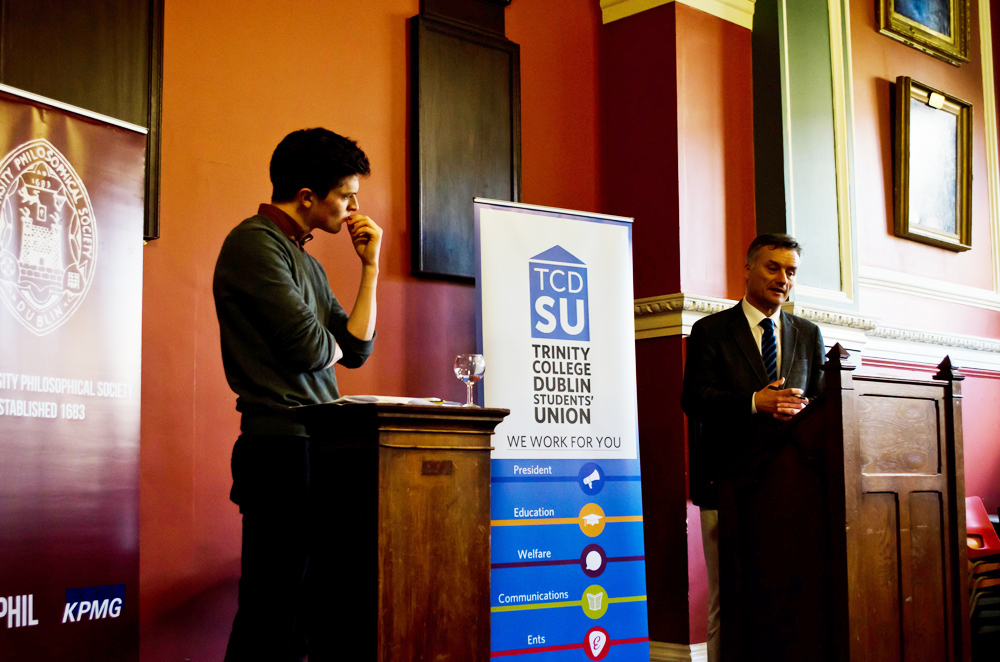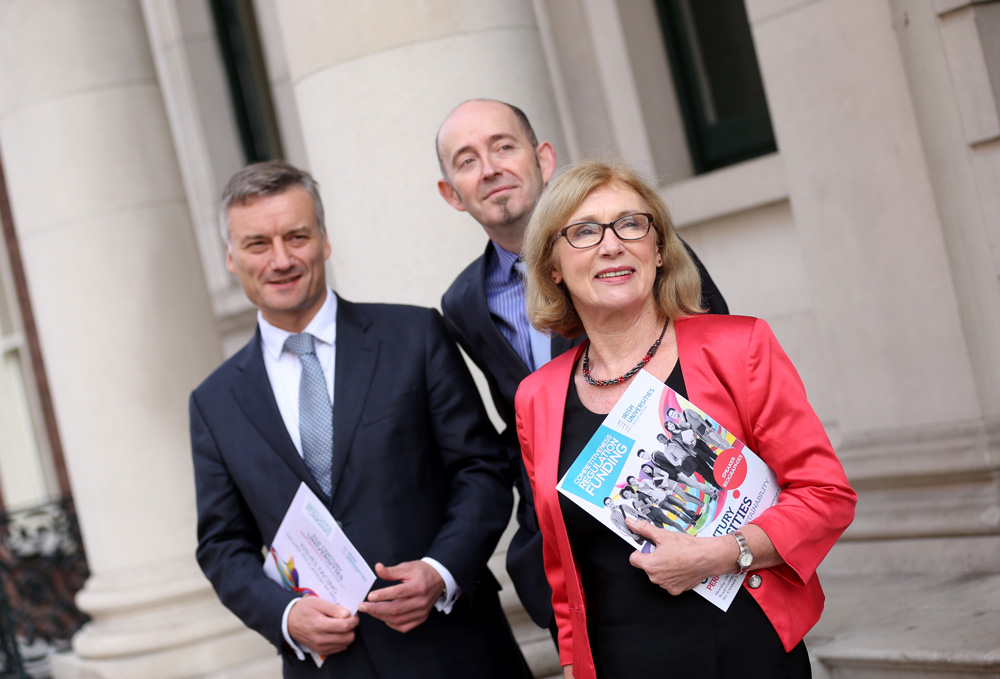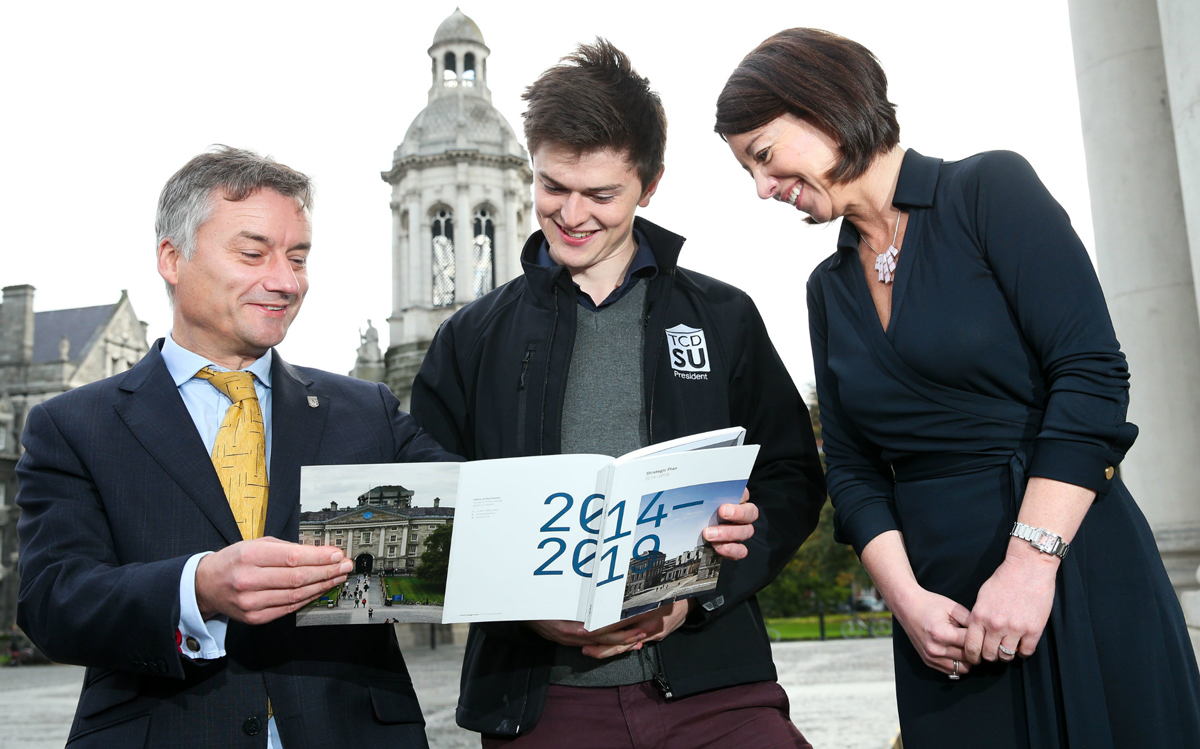Sinéad Baker | Co-Editor-at-Large
The Provost, when running for election in 2011, compiled and distributed his manifesto entitled “A Vision for Trinity College Dublin 2011–2021”. The ideas articulated in this manifesto were popular – indeed, it would be strange for him to be elected if they weren’t. Prendergast was one of five candidates that ran for the position, although it’s interesting to note that the student vote went, not to Prendergast, but to Professor Colm Kearney, a former senior lecturer.
That the contents of Prendergast’s manifesto were popular enough to get him elected, but that the last few years have seen a barrage of complaints about the way that College is run and the decisions that have been made, is something that merits examination. Indeed, that the Provost, at a Q&A with students two weeks ago in the Graduates’ Memorial Building with The Phil and TCDSU, opened by stating that he was “happy to be held account [sic] to achieve what I said I would do in my manifesto” would imply that an investigation into the content of his manifesto, and how his actions since live up to his promises, would be welcome. Again, however, it’s interesting to note that the Provost’s manifesto is not easy to find. The website on which he hosted his manifesto, patrickprendergast.com, no longer exists, for instance.
The manifesto is divided into three primary sections: ‘Trinity Values that Shaped Me’, ‘My Vision for Trinity’ and ‘My Commitments to You’. In it, he makes commitments to students, makes promises with regards to how ideas and decisions will be communicated throughout the College and sets out his aims for the future of College finances.

Commitments to Students
Prendergast correctly predicted that “income to the university through both state funding and student fees [was] likely to be remodelled in the immediate future”: non-exchequer funding comprised 64 per cent of college income for the academic year 2010–2011 and this figure rose to 73 per cent in 2012–2013. The state is investing less in higher education and College has had to diversify income as a result. In light of this, Prendergast asserted that “it is essential that this is done in a way that is fair for students”.
Reducing the funds available for these bodies that serve to provide many aspects of the student experience can be interpreted as hypocritical for someone who hailed, and continues to hail, their value.
Many recent developments, however, have unquestionably been unfair to students. The student levies that were proposed last year – such as a €250 fee for supplemental exams regardless of how many exams you had to sit – were definitely unfair, especially considering that the introduction of the levies had nothing to do with direct increases to the cost of the things they were charging for. For example, €382 of the student contribution – which everyone already pays – goes towards exams and is already enough to cover the costs for both examination sessions. By randomly picking services to charge students for College appears to have been using students as a way of filling gaps in the budget. Four of the six of these proposals are now to be significantly revised, but this came only after outcry from students and an email campaign ran by TCDSU which targeted members of Trinity’s board, who were to make the final decision.
Prendergast asserted the importance of the “student experience” in his manifesto, stating: “The Trinity student experience, both inside and outside the classroom, transformed my understanding of myself and the world”. Yet, it’s undeniable that decisions made by College have only harmed the experience. What is defined as the student experience, at least outside of the classroom, would vary from student to student: for some it would be society involvement, for others, sports, or the chance to be involved in student politics or publications. However, I would argue that life in societies, clubs, publications and the unions – the capitated bodies – has thrived in spite of College decisions rather than because of them. The cuts to these bodies were well publicised last year: funds allocated to capitated bodies were cut by 5 per cent for 2013-14, and again for 2014-15. Reducing the funds available for these bodies that serve to provide many aspects of the student experience can be interpreted as hypocritical for someone who hailed, and continues to hail, their value.
Furthermore, vital College services such as the library and health center remain underfunded and inadequate for the size of the student population, which is only expected to grow. The price of on-campus accommodation was increased by 4 per cent for this year, and charges for using the health centre were proposed. That only some of these charges or fee increases were actually introduced in the end does not take away from the hypocrisy of them being put forward: for the Provost to hail the student experience from when he was in Trinity, and then to not only fail to invest in it, but to actively try to take away from it, certainly merits criticism.
Communications and Transparency
Of course, decisions like these are no longer breaking news – they were extensively covered when they broke – but that they stand in conflict with the promises Prendergast made when he was elected is a worrying sign. What they show is the way in which decisions that affect staff, students and College as a whole, have been made: with minimal communication and consultation from those at the top
Prendergast’s manifesto saw him make the explicit commitment to improve communications within the College, yet many large decisions are made within College are made in a way which violates the Provost’s promise to “expand the emphasis on communications in our institution, creating a rapid reaction unit to monitor, respond to, inform and shape debates that concern us”. Certainly, Prendergast has invited and lead new debate on issues facing higher education, and should be commended for opening the debate with regards to the funding of third-level education at the recent symposium of the Irish Universities Association (IUA). It’s interesting to note that, in his manifesto, Prendergast said Trinity, under his leadership, would leave the Irish Universities Association if it was necessary to “differentiate the role of Trinity from other Universities in Ireland.” That Prendergast is now chair of the IUA can, perhaps generously, be seen as strategic – because acting as chair allows him to lead national debate on issues around education. But it is a bit dubious to assume the chair of an organisation that, when running for election, you said you’d seriously consider leaving.

Indeed, to promise to continue to recruit academic staff, against all evidence that this would not be possible, may even be interpreted as a ploy to get votes.
Despite this success in leading national debate, internal communications have been neglected in order to push through controversial decisions made by the College. The existence of Planning Group, a college decision-making body chaired by the Vice-Provost which does not make its minutes available to the College community or have any student representation, is evidence of this mentality. Planning Group was set up in 2008, which, of course, was before Prendergast became Provost, but while he was Vice-Provost and thus chair of the group.
This mindset can be seen across the board. Well-cited examples include the capitations committee receiving “no formal notification” of the cuts to their budget until five months after the decision was made, the Fellows’ criticism of the lack of consultation around the Identity Initiative, and the decision to house third-year Scholars in Trinity Hall that was made without consulting the Working Group on Residential Accommodation or the Scholars’ Committee.
Even those student charges proposed last year were only emailed to Board members from the Finance Committee the evening before Board – the agenda for which is typically circulated at least five days before the meeting. That these proposals were only put forward in the summer, when the majority of students were not around to protest the decision, could be seen as an attempt to catch the students’ union off guard and to minimise the effect of any objections by students.
Prendergast promised to “communicate personally with students and their representatives, holding regular monthly meetings with SU and [Graduate Students’ Union] sabbatical officers”. Last year, he repeatedly broke that promise: other than meeting last year’s student representatives at Board, which is his legal obligation, Prendergast only met them at their initial meeting. before the first meeting of Board, and to talk about the appointment of the Dean of Students. When news broke of the cuts to the capitated bodies, TCDSU were told to meet with the Vice-Provost instead of the Provost.
To introduce any measure of privatisation would contradict the commitment expressed in the manifesto to “ensuring that access to higher education is maintained for all, regardless of parental or personal income”.
That this year he has now responded to criticism for these actions by actually meeting with representatives from TCDSU and the Graduate Students’ Union (GSU) – on a monthly basis, as promised – is highly commendable, and something that students should hope to see continued in upcoming years. Indeed, when I spoke to TCDSU President Domhnall McGlacken-Byrne about the development, he said that “this level of dialogue is unprecedented in the current Provost’s tenure.” When questioned in previous years, Prendergast’s response had been along the lines of “no-one ever asked”, but, as McGlacken-Byrne commented: “The fact is, whether or not student representatives had the courtesy of extending an encouraging invitation for the Provost to fulfil something he explicitly promised to do is ultimately irrelevant. The obligation to forge lines of communication rests with those who govern and not the governed.”
At the Q&A, which notably was the Provost’s first time addressing students since 2011, Prendergast, with regards to the lack of consultation with students on these charges, commented that they “were a bit ham fistedly done, and I wasn’t happy with that myself.” But, of course, those decisions were made in a year where the Provost did not meet with student representatives. To complain about how a decision was made, when it was made by someone who reports directly to him (the Vice-Provost), is to deny responsibility. And it’s especially hypocritical considering that this decision was made in the same way that decisions under his leadership were made in many other instances.
In terms of logistical promises, the Provost’s commitment to “open the Provost’s Office, moving [it] to a more accessible part of College” has not come to fruition, although it is important to note that Prendergast is only three years into a ten-year position. In order to “increase transparency of governance”, Prendergast promised to “publish the Provost’s diary”, and, regardless of whether or not this diary has been published, if students are unanimously unaware of its existence it is safe to say that the measure has failed in its purpose of increasing transparency in the College.
Access
Prendergast publicly supports the notion of making Trinity as accessible as possible, and has hailed the work of programmes such as Trinity Access Programme (TAP), which encourages groups typically under-represented in higher education to go to university. Prendergast, in the opening of his manifesto, referred to previous Provost AJ McConnell as an “inspiration” as he “transformed the university from being an essentially private College to one that had full participation in Irish life”, promising to “continue in this mission”.
But many of Prendergast’s actions have, if anything, had the potential to narrow Trinity’s accessibility. Reports circulated to attendees at last year’s Global Graduate Forum revealed that Trinity considered a degree of privatisation, a move which would limit access to Trinity to only those who could afford it. Then-TCDSU Education Officer Jack Leahy claimed this change “would constitute a complete abdication of Trinity’s 421-year claim to the brightest minds in the country”. To introduce any measure of privatisation would contradict the commitment expressed in the manifesto to “ensuring that access to higher education is maintained for all, regardless of parental or personal income”.
At last week’s Q&A, the Provost clarified his position: “It’s not my purpose in being Provost to ensure Trinity is privatised. My purpose and my duty is to ensure that we are funded”. For Prendergast to state that privatisation is not “his purpose”, as in, the objective of his position, doesn’t do much to soothe any fears that might come from the assertion in his manifesto that he will “advocate for the re-introduction of tuition fees on the basis of alleviating the funding crisis in universities”. This statement directly contradicts his stated desire to ensure “access to students based only on academic ability”.
The increasing cost of student services will only increase the cost of going to, and staying in, Trinity. For Prendergast to hail access services such as TAP, yet not advocate systems which would keep students in college, ignores many of the harsh realities for students who are struggling to stay in Trinity. These proposed charges, those that have been approved and those that are to be reviewed, have certainly not been “done in a way that is fair for students”.
Prendergast must be commended for his work in alternative admissions, on the back of his manifesto promise to “explore admissions criteria beyond a purely points-based mechanism”. This August, twenty-five places in Trinity were offered to CAO applicants who took part in the College’s pioneering feasibility study in alternative admissions. This has established Trinity as a pioneer in terms of access, and in questioning the pervading systems in Ireland that decide who gets to College.
This means that we have to question how Prendergast ever intended to fulfill many of the promises he made in the first place.
Prendergast’s promise to “review the exam process to ensure a system flexible enough for exam methods that best suit each discipline” has been an ongoing project within Trinity over the last few years. Professor Patrick Geoghegan, who up until this year was the Senior Lecturer, worked on the concept of the Trinity Education, visiting the majority of the schools to review methods of examination and assessment across the College. It’s also important to note that the new strategic plan for Trinity, due to be launched on Wednesday, has renewed Prendergast’s commitment to renew and reform the curriculum and forms of assessment.
Staffing
The Employment Control Framework, which sets down strict limits for the number of staff appointments made in third-level institutions as well as setting pay grades for all staff, has created many problems with regards to replacing retiring staff and expanding academic posts as student numbers increase. The framework could potentially account for why, as of June 2014, only ten Ussher posts – tenured academic positions in Trinity that are not funded by the exchequer– had been appointed despite a manifesto promise to appoint “another 40 new-blood Ussher posts” within two years of his election and “thereafter sustainably grow the number of academic staff to reduce the staff:student ratio”.
At last week’s Q&A, Prendergast commented that student numbers have not been increased in order to keep the staff-to-student ratio “at the right level”. Student numbers, however, are only expected to grow as more students enter higher education, and the ratio is only increasing – the ratio in Irish universities stood at 1:15 in 2007, increasing to 1:19 today.
That the framework was only introduced in 2011, which is the year of Prendergast’s election bid and subsequent appointment, could potentially account for his conviction in asserting that Trinity “cannot allow existing staff to go unreplaced”. Though, in light of the framework and the lack of details in his manifesto as to how he intended to achieve the hiring and replacing of staff, the promise really only seems naive. Even though the framework was new, it cannot be argued that Prendergast was unaware of it. His manifesto explicitly promises to “stand firm against the inequity of the employment control framework, fighting to reinstate promotions and appointments”. Indeed, to promise to continue to recruit academic staff, against all evidence that this would not be possible, may even be interpreted as a ploy to get votes.

It’s also important to note Prendergast’s assertion that he was “determined to make staff morale one of [his] priorities in office”. Although it certainly cannot be said that all staff are unhappy with his leadership, it’s fair to say that many staff members are unhappy with how decisions are made in College. Staff have expressed dismay at the lack of consultation that has gone into many of the decisions made over the last few years, the most famous of which is the widely publicised Identity Initiative which saw the Fellows submit a memorandum to the Provost criticising the proposed name change of Trinity College Dublin and the lack of consideration of any consultation with groups around the project. It’s interesting to note that, in his manifesto, Prendergast referred to his appointment as a Fellow as “the honour which had most meaning for [him]”, yet that at times he then failed to consult with the Fellows and, in other cases, disregarded their views entirely, suggest he may be forgetting these roots.
Finances and Administration
Moreover, many of Prendergast’s promises with regards to College’s finances have been set aside. Most famously, he stated that, for Trinity to meet the challenges it faces, it “doesn’t need consultants’ reports or taskforces”, yet €3.72 million was spent on consultants’ fees last year. Prendergast stated that “reform of administration and support services will increase efficiency, reduce cost, and most importantly, it would free up academic staff time” and although the new academic registry, which centralises academic support services, has increased the College’s efficiency, it hasn’t been so successful on the costs front: the now-shelved levies proposed in June were supposed to generate €800,000 to plug a massive funding hole created by these administration projects.
With this new academic registry and START system, which serves to reform the College’s administrative structures, Prendergast has certainly began to fulfill his promise to “deliver the long-promised reform of Administration and Support services”.
In The End
It is likely there are very few people who would envy the Provost’s position. To have the responsibility of making decisions that affect the entire College community while being so visible at a time when government funding of Trinity is decreasing and there are restrictions on introducing new staff is certainly not an enviable position. However, it is crucial to recognise that Prendergast wrote his manifesto in 2011, which was a time when the realities of the recession were truly settling in. In the opening to his manifesto, Prendergast exhibited an awareness of the economic crisis and the effects that this will have for both the future of higher education and of Trinity College, with the very first line of his manifesto stating that his time in office “will begin amid a social and economic crisis unlike any seen for almost a century.”
Given his previous post as Vice-Provost, Prendergast was undoubtedly aware of both the university’s financial position and the restrictions on hiring new staff. This means that we have to question how Prendergast ever intended to fulfill many of the promises he made in the first place. In light of this, it’s disappointing that some of these promises we made in the first place. Although this article does not deal with every promise Prendergast made, with the College’s Strategic Plan due to be announced on Wednesday, and with Prendergast due to attend the second council of TCDSU, we will hopefully get further insight into the direction in which the College is heading for the remaining seven years of his tenure.
Illustration by Laura Finnegan for The University Times







